This post was updated May 29 at 1:28 p.m.
The UC Board of Regents Academic and Student Affairs Committee approved a tuition increase for 10 graduate programs at a May 14 meeting.
The board held its bimonthly meeting May 13 to May 15 at UC San Francisco. The committee addressed four agenda items during the meeting, including the approval of Professional Degree Supplemental Tuition for certain graduate programs, funding for quantum information science across the UC, updates on procedures for faculty discipline and engagement with K-12 schools in California.
The Board of Regents approved all requests it received from campuses for a PDST increase of 3% or less in alignment with the expected rate of inflation, said Regent Richard Leib. Increases were also approved for universities that requested an increase greater than 3%.
The regents approved increases for programs including UC Irvine’s master of science in biomedical and translational science, UCLA’s master of science in genetic counseling and UC Santa Cruz’s master of science in human computer interaction.
Emily Quinn, the director of the master of science in genetic counseling program at UCLA, said her program’s well-rounded curriculum helps prepare students for dynamic career opportunities. UCLA requested an annual 5% increase in PDST funding for the program to provide instructional and student support, she added.
“We propose to increase PDST to help ensure the long-term health of our program and to provide strong instructional support as well as student services,” said Quinn, an associate adjunct professor in the program.
All programs have committed to providing PDST waivers for students eligible for the Native American Opportunity Plan – which covers in-state tuition and fees for California students in recognized Native American Tribes – Leib said.
The committee then discussed the importance of UC investment in quantum information science.
Steven Kahn, dean of mathematical and physical sciences at UC Berkeley, said quantum information science has a significant impact on computing, as quantum computers can complete larger calculations and use less energy. This is key as exorbitant amounts of energy are being used with current computers to support artificial intelligence functions, he said.
According to the Quantum Economic Development Consortium, the field in California alone is expected to have a commercial impact of $70 billion annually by 2030.
Kahn, a professor of physics and astronomy, said he believes California must follow other states who have invested in quantum information science in order to capitalize off of emerging technologies. He added that their investments should be centered around improving research and infrastructure in quantum information science.
Regent Jose Hernandez asked about the range of technologies that will be covered with increased funding. Kahn said the UC has the capacity to experiment with many developing technologies due to its large size.
“We are the fora that people can hold meetings to talk about what’s happening in the different technologies and how it’s going. The companies are too invested in individual choices to do that on their own,” Kahn said. “So I think there’s a big enabling role for the UC system here to further this field, not only for California, but for the world.”
UCLA Chancellor Julio Frenk said at the meeting that he was interested in how the quantum science field might help UCLA’s Research Park.
[Related: UCLA Downtown confirms 31 programs, UCLA Research Park appoints immunology advisor]
Khan said there is a wide breadth of applications of quantum technologies – primarily software – and that fundamental research is being explored across UC campuses.
The committee also proposed recommendations on faculty discipline and dismissal, which were made by the Joint Senate-Administration Workgroup, and seek to expedite disciplinary processes for UC faculty.
Audrey Jacobs, a UC Davis student observer, said the recommended policy would not allow faculty a fair chance to defend themselves.
“I am deeply concerned that by setting deadlines and only allowing exceptions to be made on a case-by-case basis, due process will be deprioritized and faculty members will be unjustly punished,” Jacobs said. “The disciplinary process is given the length it is for good reason – to ensure that all parties and evidence are considered before arriving at a specific conclusion and resulting sanction.”
Jacobs added that she urged the regents not to use the new disciplinary policy as a way to “stifle” dissent toward faculty who teach about Israel and Palestine in their courses.
Maria Anguiano – the vice chair of the Board of Regents – said the policy is largely related to disciplinary measures required for sexual harassment and is a general improvement in disciplinary practices.
The Joint Senate-Administration Workgroup’s recommendations included guaranteeing disciplined faculty a Privilege and Tenure hearing within 60 days of a chancellor filing charges, according to a presentation by Steven Cheung, a faculty representative from UCSF, and Douglas Haynes, the interim vice provost. There will be a systemwide Privilege and Tenure committee that will serve as a jury, Cheung added.
The chancellor will oversee most decisions regarding faculty punishment and can suspend them without pay if a violation is a concern, according to the presentation by Cheung and Haynes.
Provost Katherine Newman said the new disciplinary proposals will undergo a 30-day systemwide review. The Joint Senate-Administration Workshop aims to finalize their proposal by the July regents meeting, Cheung said.
Leib added that students also expressed discontent with the cancellation of classes due to the pro-Palestine encampments and the professors who supported those cancellations. UCLA canceled classes for one day after the first Palestine solidarity encampment in May 2024 and moved instruction to a remote format for seven days.
[Related: UCLA cancels classes following violence at Palestine solidarity encampment]
The last agenda item addressed was a Board of Admissions and Relations with Schools update on California K-12 engagement. BOARS oversees all matters pertaining to undergraduate admissions.
Newman said there needs to be stronger collaboration between the UC and K-12 schools with regard to admissions.
The BOARS bylaws will be amended to codify consultations between the California State Board of Education and undergraduate admission at the UC, said Deborah Swenson, the chair of BOARS. BOARS will also collect information from K-12 schools to inform scholastic requirements for students – a measure which the Academic Senate approved in April, she added.
“We work with the principle of ‘no surprises,’” said faculty representative Ahmet Palazoglu.
Student Regent Josiah Beharry added that despite these curricular updates, he was disappointed that ethnic studies will not be a requirement in the updated A through G high school curriculum.
Leib said he was concerned this policy will not satisfy the state legislature, as it will not codify the level of communication between BOARS and K-12 schools they wish to see. In response, Newman said she would speak to different assembly members about collaboration and improvement of these bylaws.
“I seem to be making a regular pilgrimage (to Sacramento),” Newman said. “If there are legislators you think I should speak to, I would be very happy to do that – just to bring them up to date on what our colleagues in BOARS are doing and what they’ve accomplished.”
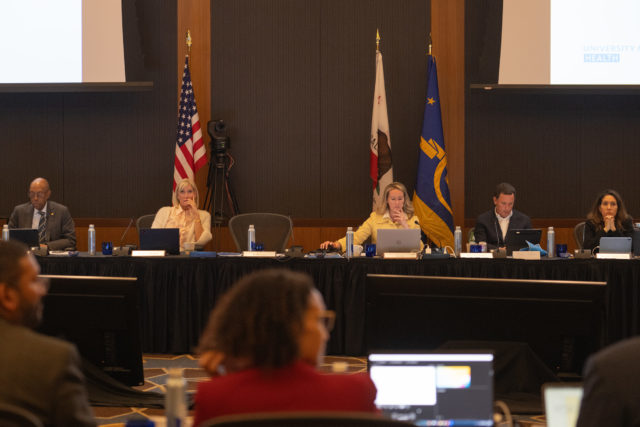

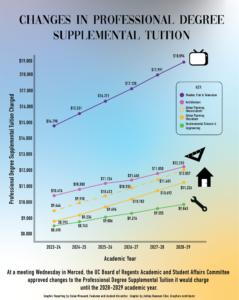
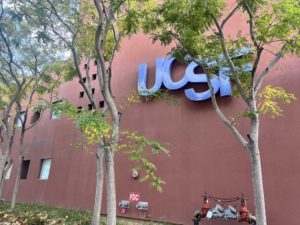
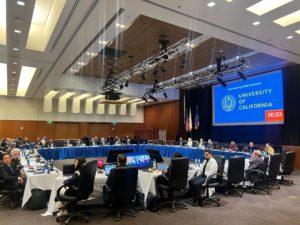
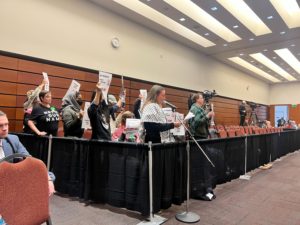
Comments are closed.